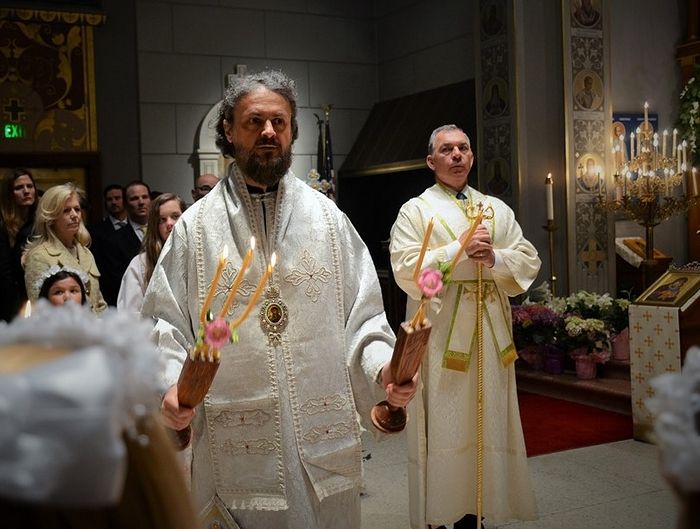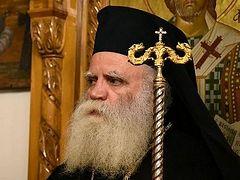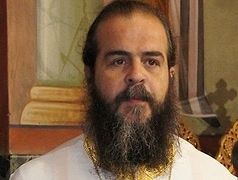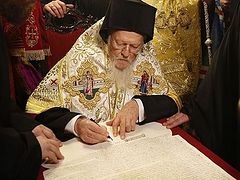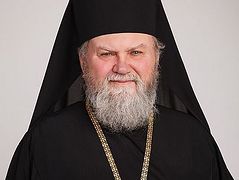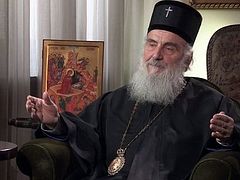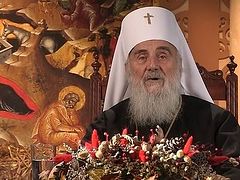Belgrade, May 17, 2019
His Grace Bishop Maxim of the Western American Diocese of the Serbian Orthodox Church caused waves recently following his January interview with Serbica Americana in which he addressed, among other topics, the question of the autocephaly for the Ukrainian schismatics and the 800th anniversary of the Serbian Church’s autocephaly, being celebrated this year, which was acquired by St. Sava, the first Archbishop and greatest saint of the Serbian Church.
According to the Serbian newspaper Politika, the Bishops’ Council of the Serbian Church, currently in session, discussed the Church crisis in Ukraine on Tuesday, as well as the views expressed by Bp. Maxim.
In particular, Bp. Maxim had expressed the opinion that the way in which St. Sava acquired autocephaly for the Serbian Church is analogous to how the schismatics acquired autocephaly in Ukraine.
“In 1219, the Ecumenical Patriarch completely ignored the canonical situation in the regions of the state of Stefan Nemanja, which, it is important to note, fell under the jurisdiction of the Ohrid Archbishop Demetrios Homatian, and contrary to the canons, appointed ‘autocephaly’ to the Serbian state. Today we are all proud and happy about this bold, otherwise ‘non-canonical’ act,” Bp. Maxim said.
He expressed this same idea twice in the interview, adding that, “This historical moment from the beginning of the 13th century is an interesting but powerful analogy with some recent events in the Orthodox world.”
In the interview, he also expresses the view, which he acknowledges is in the minority, that Constantinople acted selflessly in Ukraine and that the Church under His Beatitude Metropolitan Onuphry of Kiev and All Ukraine should simply rejoice that their fellow Ukrainians have found their way into the Church. This “cross of a historical decision” taken up by Patriarch Bartholomew may prove to lead to deeper unity, Bp. Maxim believes, though it is widely acknowledged in several Local Churches that it has led to deeper division for now.
And in preparation for the typical pan-Orthodox celebrations on the Sunday of Orthodoxy, Bp. Maxim issued a communiqué that directly contradicted the official position statement of the Serbian Church. He wrote: “There are strange and contradictory attitudes coming from various sides whose messengers are somewhere claiming and somewhere suggesting that the Serbian church is supposedly recommending that we distance ourselves from those with whom, until now, we have been in communion.”
However, the Serbian Church’s official position statement (translating from the Serbian) stipulates precisely what Bp. Maxim is denying. Point 5 reads:
And finally, the Serbian Church is naturally compelled to recommend that its hierarchs and pious clerics refrain from liturgical and canonical communication not only with the above-mentioned Mr. Epiphany (Dumenko) and others like him, but also with the hierarchs and clerics who communicate with them, according to the principle of the sacred canons that those, who have communion with the excommunicated place themselves outside communion as well.
A petition circulated amongst the Serbian clergy in America prior to the Council, listing a number of grievances against Bp. Maxim. They particularly decried his “support for Ukrainian schismatics, comparing SOC [Serbian Orthodox Church—O.C.] autocephaly to the false and shameful autocephaly of the neo-fascist quasi-Church that the Phanar illegally created in Ukraine.”
“We believe that the St. Savva and the SOC have experienced no greater insult during these 800 years, and it is from a bishop of the Serbian Church!” the petition continues.
Being questioned by his brother bishops during the Council, Bp. Maxim said that he had expressed himself clumsily in the interview and that he, in fact, fully supports the Council’s earlier expressed opinion on the Ukrainian issue, and that St. Sava acquired autocephaly for the Serbian Church in manner consistent with the Tradition and canons of the Orthodox Church.
At its November 6-7 session, the Council of Bishops noted that the Ukrainian schismatics have no ordination and that the Patriarchate of Constantinople rehabilitated them uncanonically, and rejected any liturgical or canonical communion with them. The Council also proposed to that the issue be addressed in a pan-Orthodox council.
The session proceeded in a peaceful and conciliatory tone, Politika reports, despite the polemical statements voiced in the media by Bp. Maxim and His Grace Bishop Irinej of Bačka in the run-up to the council.
The clergy petition also lamented Bp. Maxim’s belief in evolution, which caused a public scandal in 2017, and what they see as his encouragement of the new calendar in his diocese.
Follow us on Facebook!

